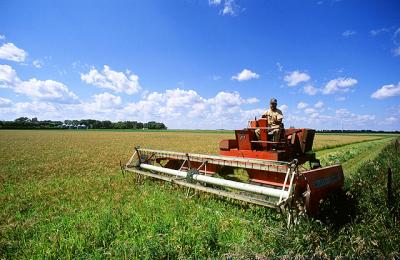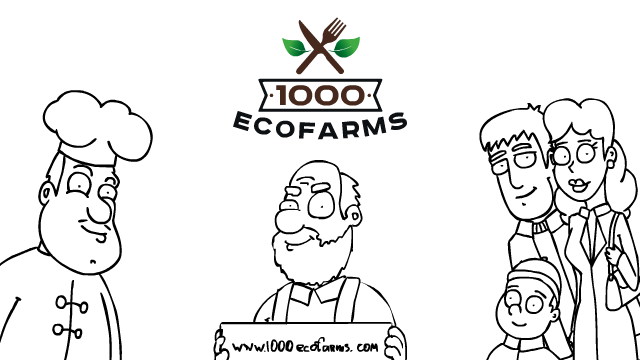Organic grower Craig Murphy windrows wheat on his farm near Morris, Minnesota. Photo by Bruce Fritz.
A new review study, “Organic agriculture in the twenty-first century”, published in the February issue of the journal Nature Plants is the first study to utilize 40 years of scientific research to compare long-term implications of conventional and organic farming. The review study considers the different farming practices on four aspects of sustainability: productivity, environmental impact, economic viability, and social wellbeing.
Productivity refers to crop yield, a frequent source of criticism — and misconceptions — of organic farming. The review study acknowledges that organic farming typically produces 10-20% lower yields than conventional. However, some argue that environmental benefits outweigh these numbers.
Environmental impacts were also examined, noting that conventional farming—by contributing to biodiversity loss, environmental degradation, and more—had significantly greater negative impacts on the environment than organic farming (a fact that many believe makes up for the lower yields). Organic farming is actually associated with greater soil health and greater biodiversity.
Profitability was found to be greater for the organic farmer than the conventional farmer, due to consumers’ willingness to pay more for such products. It’s also noted that the increase in cost could be considered as payment for the ecosystem services that organic farming helps preserve.
Greater wellbeing—though there weren’t as many studies on this to review—also showed a slight advantage for organic farming when it comes to working conditions, including number of jobs provided and exposure to chemicals. Though the review study found there is room for improvement in this area for both farming methods.
Dr. John Reganold, Professor of Soil Science and Agroecology at Washington State University, conducted the review study with his Ph.D. student Jonathan Wachter. In a summary, Dr. Reganold states that “no single type of farming can feed the world”, and that what is necessary is a blend of farming practices, including some that may have yet to be discovered.
He also calls for changes in policy, including financial incentives for farmers to adopt conservation practices, expansion of outreach and technical assistance for farmers, and an increase in publicly funded research related to sustainable farming. However, until such policies are in place, consumers can still do their part by buying organic and local food as much as possible—and it’s one of 1000 Eco Farms’ goals to make that reality possible for everyone.
Productivity refers to crop yield, a frequent source of criticism — and misconceptions — of organic farming. The review study acknowledges that organic farming typically produces 10-20% lower yields than conventional. However, some argue that environmental benefits outweigh these numbers.
Environmental impacts were also examined, noting that conventional farming—by contributing to biodiversity loss, environmental degradation, and more—had significantly greater negative impacts on the environment than organic farming (a fact that many believe makes up for the lower yields). Organic farming is actually associated with greater soil health and greater biodiversity.
Profitability was found to be greater for the organic farmer than the conventional farmer, due to consumers’ willingness to pay more for such products. It’s also noted that the increase in cost could be considered as payment for the ecosystem services that organic farming helps preserve.
Greater wellbeing—though there weren’t as many studies on this to review—also showed a slight advantage for organic farming when it comes to working conditions, including number of jobs provided and exposure to chemicals. Though the review study found there is room for improvement in this area for both farming methods.
Dr. John Reganold, Professor of Soil Science and Agroecology at Washington State University, conducted the review study with his Ph.D. student Jonathan Wachter. In a summary, Dr. Reganold states that “no single type of farming can feed the world”, and that what is necessary is a blend of farming practices, including some that may have yet to be discovered.
He also calls for changes in policy, including financial incentives for farmers to adopt conservation practices, expansion of outreach and technical assistance for farmers, and an increase in publicly funded research related to sustainable farming. However, until such policies are in place, consumers can still do their part by buying organic and local food as much as possible—and it’s one of 1000 Eco Farms’ goals to make that reality possible for everyone.






